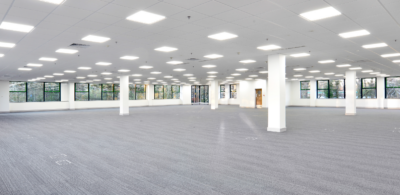A new space can bring with it more opportunities to expand your business, recruit talent, retain your best employees and boost morale. Whether you’re preparing for a move or if you foresee one in the future, here are four mistakes to avoid.
Not Hiring a Professional
Hiring a professional is the wise thing to do. Period, end of story. You’re running a business and growing a business. The last thing you need is to be driving around the market, calling numbers off of “For Lease” signs.
Studies have shown that for tenants who call around based on the aforementioned signs, it takes them two weeks to do what a real estate professional can do in two days. We can not only save a tremendous amount of your valuable time but we know the buildings, owners, trends, comps and more — all of which will add much-needed leverage to your search for space. Oh, and in case you’re wondering: commissions are paid by the owners, not the tenants.
Starting Late
If you ask a professional how early you should be out looking for space, they will tell you at least six to 12 months prior to lease expiration. Sure, the timing can vary depending on how much space you need, how much construction is going to be needed, etc. However, all too often we see tenants looking for space with three months or less before their existing leases expire.
If that’s you, it is possible to find a space, but you might end up with a less-than-desirable space. You won’t have as much negotiating power and therefore you won’t be able to negotiate the most favorable terms. Lastly, you’ll be in a rush to pick finishes, hire vendors and coordinate all the necessary moving parts. That will add an enormous amount of unneeded stress to your life and will likely cause delays and added expenses that could have been avoided by starting the process earlier.
Not Knowing How Much Space You Need
This is actually a really important piece of the puzzle. And it’s not easy for tenants to know exactly how much space they need — for some, it can feel like throwing a dart at a board.
There are industry-standard metrics that allocate a specific amount of rentable square feet per employee but this figure changes every few years and can vary by industry. This is something your broker should be able to educate you on.
If you take too much space or too little, you might find yourself looking to sublease a portion of your space or you’ll be in the market again before you know it, looking for a bigger space. So, do your best to lease the appropriate amount of space — which factors in space for future expansion. Any additional amount you might pay in rent will probably be less than the costs associated with having to move again.
Not Knowing Your Lease Expiration
This is another timing issue and goes hand in hand with starting late. And I can’t blame you for not knowing your lease expiration. You sign the lease, throw it in a drawer and then forget about it. But ideally, you should familiarize yourself with your lease once a year to keep the details fresh in your mind. Further, your real estate professional should be checking in with you from time to time and hopefully they are keeping you notified. If they aren’t, it might be time to find a new broker.
In addition to the actual lease expiration date, there’s most likely a notification period. This is the period of time when you or your broker should notify your landlord with your intention to renew or relocate. Under a renewal scenario, if you miss your notification period, you might lose negotiating power. On a relocation, if you’re not looking for space by the time your notification period hits, then you’re definitely off to a late start.
The above are only four items on a long list of mistakes that tenants make from time to time. If you want to keep them to a minimum, you should hire a professional to help you stay on time and on track. Just like you’re a pro at your job, a broker will be a pro at theirs — leading you step by step through the process.

 Colliers Insights Team
Colliers Insights Team
 Aaron Jodka
Aaron Jodka
 Amber Merrigan
Amber Merrigan
 Andrew Steele
Andrew Steele